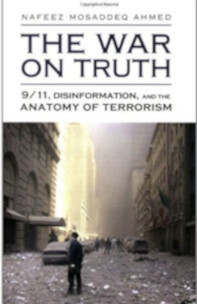The War On Truth
9/11, Disinformation and the Anatomy of Terrorism
Ahmed’s first book, The War on Freedom, was acclaimed around the world for its meticulous compilation of facts about 9/11. Published just a little over a half year after the attacks, it was the first book to document the inconsistencies and contradictions in the government’s official version of what happened.
The ame analysis and information was built upon in this book, The War on Truth, with new material including analysis of the 9/11 Commission Report.
First published by Olive Branch Press (US) in 2005.

Reviews (for The War On Freedom & The War On Truth)
“On the subject ‘How and Why America was Attacked on 11 September, 2001’, the best, most balanced report, thus far, is by Nafeez Mosaddeq Ahmed. Yes, yes, I know he is one of Them. But they often know things that we don’t – particularly about what we are up to.”
Gore Vidal
“Nafeez Ahmed’s understanding of the post 9/11 power game, its lies, illusions and dangers, is no less than brilliant. Everyone should read this wise and powerfully illuminating book.”
John Pilger
“In his disturbing and clearly evidenced book, The War on Truth, Nafeez Mosaddeq Ahmed traces the unholy games played with Islamist terrorists by the US, and through acquiescence by the UK, flirting with them when it suited and then turning against them.”
Yasmin Alibhai-Brown, The Independent
“Nafeez Ahmed demonstrates brilliantly that the war on freedom is inseparable from the war on truth.”
Vandana Shiva
“Nafeez Mosaddeq Ahmed, director of British think-tank the Institute for Policy Research and Development, has written furiously against the ‘fundamentally wrong’ official narrative in his book The War On Truth. He provides evidence to show the ways that western governments are currently manipulating Al Qaeda ‘for strategic aims’ in different parts of the world, thus compromising any notion of the war on terror.”
The Big Issue
“Academically, objectively, this book is about as carefully laid out and sourced as one could want… This book is, in brief, everything the 9/11 Commission was not… Having been a part of the CIA when it was committing high crimes and misdemeanors in Central America… I find the author’s argument that the US, the UK, and France, among others, have been actively using terrorists, nurturing terrorists, as part of a geopolitical and economic strategy, and that in their naivete, they nurtured a force they cannot control today, to be completely credible.”
Robert D. Steele, former 20-year veteran CIA Case Officer and Marine Corps infantry and intelligence officer; founding Deputy Director of US Army Marine Corps Intelligence Command
“The War on Truth is an outstanding book on arguably the most important issue of our times. I hope it receives the widespread attention it so richly deserves.”
Robert W. McChesney
“Against the background of exhaustive research, Ahmed accomplishes the most detailed and wide-ranging study to date of the powerful vested interests and intrigues responsible for the collapse of US national security in the years and months leading up to 9/11.” Middle East Journal
“Nafeez Mosaddeq Ahmed argues intriguingly that US training of al-Qaeda in Afghanistan did not end with the collapse of the Soviet Union. He delves into Washington’s post-Cold War military training of al-Qaeda members involved in 9/11 to support his claim that they continue to constitute a mercenary force at the disposal of American statecraft. The implications of al-Qaeda as a covert creation of Western intelligence agencies to destabilize Third World states are ignored in the official story of the US War on Terror.”
Socialism and Democracy
“This volume tries to understand 21st-century terrorism, not primarily as a replacement for the Cold War Soviet Union, but as a Western disinformation campaign to control raw materials and populations on a global scale…. His contribution is necessary for anyone who wants to write about the Global War on Terror and US preoccupation with terrorism in the 21st century. The book is also important for the understanding of the present war in Afghanistan.”
Journal of Peace Research